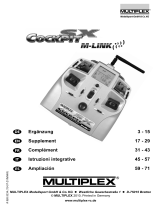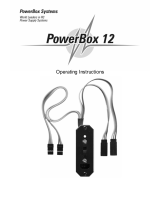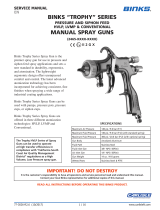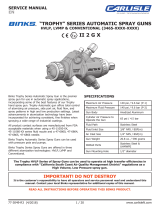Page is loading ...

© MULTIPLEX Modellsport GmbH & Co. KG Westliche Gewerbestr 1 D-75015 Bretten
GERMANY
SafetySwitch 6/12 HV TwinBatt
6 HV 12 HV 12 HV M6
12 HV TwinBatt 12 HV TwinBatt M6
Anleitung
2 – 3
Instructions
4 – 5
Instructions
6 – 7
Instrucciones
8 – 9
Istruzioni
10 – 11
Rev.: 01.09.2010

Operating instructions SAFETY
Operating instructions SAFETYOperating instructions SAFETY
Operating instructions SAFETY-
--
-SWITCH 6HV
SWITCH 6HVSWITCH 6HV
SWITCH 6HV
SAFETY
SAFETY SAFETY
SAFETY-
--
-SWITCH 12HV / 12HV (M6) / 12HV TwinBatt / 12HV TwinBatt (M6)
SWITCH 12HV / 12HV (M6) / 12HV TwinBatt / 12HV TwinBatt (M6)SWITCH 12HV / 12HV (M6) / 12HV TwinBatt / 12HV TwinBatt (M6)
SWITCH 12HV / 12HV (M6) / 12HV TwinBatt / 12HV TwinBatt (M6)
MULTIPLEX Modellsport GmbH & Co.KG • Westliche Gewerbestraße 1 • D-75015 Bretten (Gölshausen) • www.multiplex-rc.de Page 1/2
Operating instructions SAFETY
-SWITCH 6 HV / 12 HV / 12 HV (M6) / 12HV TwinBatt / 12HV TwinBatt (M6) • # 82 5895 (10-02-25/BRAN) • Errors and omissions expected! •
MULTIPLEX
! These operating instructions are an integral part
of the product, and contain important information
and safety notes. Store them in a safe place, and be
sure to pass them on to the new owner if you
dispose of the product.
! Read right through the instructions before use!
1. F
EATURES
, M
ETHOD OF
W
ORKING
• Electronic safety switch harness
• Compact design, low weight
• SMT construction, low-wear, vibration-proof
• High-quality gold-plated connector systems and large con-
ductor cross-sections
• High continuous current capacity
• Failure-proof: if a fault develops in the slide switch or its con-
necting leads, the electronic circuit ensures that the last
active switched stage (ON or OFF) is maintained. This
means: even if the switch comes adrift in flight due to
vibration, the power supply to the RC system is reliably
maintained.
• Two receiver leads provide double the conductor cross-
section and twice the number of contacts in the case of the
SAFETY-SWITCH 12HV / 12HV TwinBatt.
• MPX M6 high-current connector on the SAFETY-SWITCH
12HV (M6) / 12HV TwinBatt (M6) for direct connection to
MULTIPLEX RX-9/12/16-DR pro M-LINK or RX-9/12-SYNTH
DS M-PCM receivers.
• Integral battery backer in the case of the SAFETY-SWITCH
12HV TwinBatt / 12HV TwinBatt (M6). Both batteries are
discharged simultaneously and evenly. If one battery should
fail, the second pack powers the receiving system on its own.
• Two sensor sockets on the SAFETY-SWITCH 12HV
TwinBatt, for monitoring the voltage of both receiver batteries
in flight. This provides a more accurate method of assessing
the state of the receiver battery while the model is flying.
The switch harness is an important safety-relevant component in
the receiving system power supply chain. After a certain period of
use, conventional switch harnesses with purely mechanical
switches represent a security risk due to ageing effects such as
vibration, wear and corrosion. What is more, the demands placed
on switch harnesses are rising due to the power requirements of
modern high-performance servos. Many conventional, purely
mechanical switches are simply not up to the job.
The receiver battery or batteries are connected directly to the
SAFETY-SWITCH circuit board. The unit is connected directly to
the receiver by a short cable which features no mechanical
switch element. The switching function is carried out by
extremely reliable, vibration-proof, high-performance FETs, which
exhibit very low internal resistance compared with mechanical
switches. In conjunction with high-quality gold-contact connectors
and cables of generous cross-section it is finally possible to
exploit the full performance potential of modern servos.
A mechanical slide switch acts as the ON / OFF switch element,
but all it does is provide the ON / OFF switching signal. The load
current does not flow through this switch. The switch can be
installed in any easily accessible position in the model.
2. I
NSTALLATION
, F
IRST
U
SE
SAFETY-SWITCH 6HV / 12HV / 12HV (M6) /
12HV T
WIN
B
ATT
/ 12HV T
WIN
B
ATT
(M6)
1. Mount the SAFETY-SWITCH harness in the model in a
position where it is well protected from vibration and shock.
2. SAFETY-SWITCH 6HV: connect the UNI lead (RX) to your
receiver’s battery socket.
SAFETY-SWITCH 12HV / 12HV TwinBatt
: connect the
second UNI lead (RX) to any vacant servo socket on the
receiver, or - if present - the receiver’s second battery socket.
! Note
When connecting the UNI lead(s) (RX) please take care to
maintain correct polarity; this applies in particular to the pin
assignment of other makes of equipment:
SAFETY-SWITCH 12HV (M6) / 12HV TwinBatt (M6): connect
the two-core lead (RX) terminating in an M6 socket to the M6
connector on the MULTIPLEX RX-9/12/16-DR pro M-LINK or
RX-9/12-SYNTH DS M-PCM receiver.
3. Install the mechanical ON/OFF slide-switch in any con-
venient position in the model, if possible protected from
accidental actuation.
Connect the 4 - 6 NiXX cells or 2S LiXX battery pack(s) to the
socket(s) marked “BATT” on the SAFETY-SWITCH. Take
care to maintain correct polarity:
! Note
The basic rule is that you should only connect components to
your receiver which are designed for the voltage of the
receiver battery you are using (4 – 6 cells or 2S LiXX).
! Note
The integral battery backer is a reliable, robust diode type
consisting of few components. The voltage drop across the
backer is around 0.5 V.
! Note
The SAFETY-SWITCH 12HV TwinBatt should only ever be
used with two identical batteries: same type, capacity, voltage
curve, age and performance.
• Connector system on the SAFETY-SWITCH 6 HV:
MULTIPLEX MP-RC. Matching connectors: MP-RC battery
lead (# 8 5102) or MP 3-pin socket (# 8 5225).
• Connector system on the SAFETY-SWITCH 12HV (M6) /
12HV TwinBatt (M6): M6 plug.
Matching connector: M6 socket (# 8 5214).
4. Switch your transmitter ON, then switch your receiving
system’s power supply ON using the SAFETY-SWITCH’S
ON/OFF switching element. When switching OFF: first
operate the SAFETY-SWITCH’S ON/OFF switching element,
and only then switch the transmitter off.
! Note
The lead to the mechanical ON/OFF slide-switch can be
extended to any length if necessary.
5. If you are using a telemetry-capable receiver and transmitter
together with one of the 12HV TwinBatt / 12HV TwinBatt (M6)
versions it is possible to connect a voltage sensor (# 8 5400)
to one of the two 2-pin UNI sockets on the circuit board; this
is accomplished by connecting the sensor lead (supplied with
the sensor) to one of the two sensor sockets
(Sensor 1 / Sensor 2). If you connect a second sensor lead
(# 8 5056) to sensor output 2 on the SAFETY-SWITCH 12HV
TwinBatt / 12HV TwinBatt (M6), you can transmit the voltage
values for both receiver batteries to the transmitter (e.g.
ROYALpro) after activating the second measuring channel;
this is carried out using a MULTImate (# 8 2094) or Sensor
DataManager.

Operating instructions SAFETY
Operating instructions SAFETYOperating instructions SAFETY
Operating instructions SAFETY-
--
-SWITCH 6HV
SWITCH 6HVSWITCH 6HV
SWITCH 6HV
SAFETY
SAFETY SAFETY
SAFETY-
--
-SWITCH 12HV / 12HV (M6) / 12HV TwinBatt / 12HV TwinBatt (M6)
SWITCH 12HV / 12HV (M6) / 12HV TwinBatt / 12HV TwinBatt (M6)SWITCH 12HV / 12HV (M6) / 12HV TwinBatt / 12HV TwinBatt (M6)
SWITCH 12HV / 12HV (M6) / 12HV TwinBatt / 12HV TwinBatt (M6)
MULTIPLEX Modellsport GmbH & Co.KG • Westliche Gewerbestraße 1 • D-75015 Bretten (Gölshausen) • www.multiplex-rc.de Page 2/2
Operating instructions SAFETY
-SWITCH 6 HV / 12 HV / 12 HV (M6) / 12HV TwinBatt / 12HV TwinBatt (M6) • # 82 5895 (10-02-25/BRAN) • Errors and omissions expected! •
MULTIPLEX
! Note
We recommend the use of the SAFETY-SWITCH 6HV in
models fitted with up to six standard or four digital / high-
performance servos. Above this number you should use
the SAFETY-SWITCH 12HV or SAFETY-SWITCH 12HV
TwinBatt.
! Note
For safety reasons we also recommend the use of a Peak
Filter (# 8 5180) in conjunction with the SAFETY-SWITCH
TwinBatt, as voltage peaks which may be induced by high-
performance servos cannot be buffered from the receiver
batteries due to the blocking action of the battery backer
diodes.
3. S
PECIFICATION
SAFETY-SWITCH 6HV 12HV 12HV (M6)
12HV
TwinBatt
12HV Twin-
Batt (M6)
Order No:
# 8 5006 # 8 5007 # 8 5008 # 8 5009 # 8 5010
Cell count: 2S LiPo / LiXX or 4 – 6 NiXX cells
Permissible con-
tinuous current:
max. 6 A max. 12 A
Idle current
drain*:
approx. 2.5 mA (in OFF state)
Receiver lead:
1 x 0.33
mm
2
UNI ap-
prox. 200
mm long
2 x 0.33
mm
2
UNI ap-
prox. 200
mm long
1 x 2.5
mm
2
M6 approx.
200 mm
long
2 x 0.33
mm
2
UNI approx.
200 mm
long
1 x 2.5
mm
2
M6 approx.
200 mm
long
Battery
connectors:
MPX MP-
RC plug
MPX M6
plug
MPX M6
plug
2 x MPX M6
plug
2 x MPX M6
plug
Dimensions
(L x W x H):
approx.
38 x 28 x 6
mm
approx.
38 x 28 x 6
mm
approx.
38 x 28 x 6
mm
approx.
50 x 40 x 10
mm
approx.
50 x 40 x 10
mm
Weight:
(incl. leads)
approx.
20 g
approx.
25 g
approx.
30 g
approx.
35 g
approx.
35 g
Special features
Battery
backer /
2 sensor
sockets [V]
Battery
backer /
2 sensor
sockets [V]
!
Note
* The stated idle current flows when the mechanical slide switch
is in the OFF position. For this reason you should always
disconnect the receiver battery from the SAFETY-SWITCH if the
model is to be stored for a long period. This will prevent any risk
of the receiver battery becoming deep-discharged.
4. G
UARANTEE
/ L
IABILITY
E
XCLUSION
The company MULTIPLEX Modellsport GmbH & Co.KG accepts
no liability of any kind for loss, damage or costs which are due to
the incorrect use and operation of this product, or which are
connected with such operation in any way. Unless the law
expressly states otherwise, the liability on the part of MULTIPLEX
Modellsport GmbH & Co.KG to pay damages, regardless of the
legal argument employed, is limited to the invoice value of those
products supplied by MULTIPLEX Modellsport GmbH & Co.KG
which were directly involved in the event in which the damage
occurred. This does not apply if liability is incurred according to
statutory law on account of intentional or gross negligence.
We guarantee our products in accordance with the currently valid
statutory regulations. If you wish to make a claim under
guarantee, your initial course of action should always be to con-
tact the dealer from whom you purchased the equipment.
The guarantee does not cover faults and malfunctions which are
caused by the following:
• Incorrect or incompetent use
• Maintenance carried out incorrectly, belatedly or not at all,
or not carried out by an authorised Service Centre
• Incorrect connections
• The use of accessories other than genuine MULTIPLEX
items
• Modifications or repairs which were not carried out by
MULTIPLEX or by an authorised MULTIPLEX Service
Centre
• Accidental or intentional damage
• Defects due to normal wear and tear
• Operation of the unit outside the limits stated in the
specification
• Operation of the unit in conjunction with equipment made by
other manufacturers.
5. CE C
ONFORMITY
D
ECLARATION
This device has been assessed and approved in
accordance with European harmonised directives.
This means that you possess a product whose design and
construction fulfil the protective aims of the European Community
designed to ensure the safe operation of equipment.
The detailed CE conformity declaration can be downloaded in the
form of a PDF file from the Internet under www.multiplex-rc.de. It
is located in the DOWNLOADS area under PRODUKTINFOS.
6. D
ISPOSAL
N
OTES
Electrical equipment marked with the cancelled waste bin
symbol must not be discarded in the standard household
waste; instead it should be taken to a suitable specialist
disposal system.
In the countries of the EU (European Union) electrical
equipment must not be discarded via the normal domestic refuse
system (WEEE - Waste of Electrical and Electronic Equipment,
Directive 2002/96/EG). You can take unwanted equipment to
your nearest local authority waste collection point or recycling
centre. There the equipment will be disposed of correctly and at
no cost to you.
By returning your unwanted equipment you can make an
important contribution to the protection of the environment!
/




